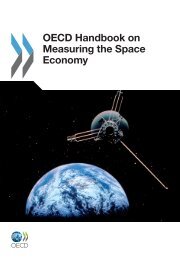Evaluating Country Programmes - OECD Online Bookshop
Evaluating Country Programmes - OECD Online Bookshop
Evaluating Country Programmes - OECD Online Bookshop
You also want an ePaper? Increase the reach of your titles
YUMPU automatically turns print PDFs into web optimized ePapers that Google loves.
<strong>OECD</strong> 1999<br />
<strong>Country</strong> Assistance Strategies as a Management and Evaluation Instrument for Donors<br />
– Early-warning pointers: An effective monitoring instrument should contain<br />
pointers bearing on critical variables that might impair goal achievement,<br />
and in this way contribute to an early identification of possible substantive,<br />
time-related, or financial discrepancies. Information on the framework conditions,<br />
counterpart institutions, and target groups in the projects to be undertaken,<br />
on co-ordination of the various development co-operation<br />
instruments, on conditions, etc. that are called for in the detailed presentation<br />
of priority areas in a country concept fulfils this function precisely if it<br />
constitutes not only planning references but also monitoring or early-warning<br />
pointers. Each of these variables can lead to significant substantive, timerelated,<br />
and financial divergences from initial planning. <strong>Country</strong> concepts<br />
that do not contain any such information, or only in rudimentary form, are not<br />
well suited as an instrument of effective planning and monitoring. The results<br />
of the evaluation of country concepts led to a recommendation for additional<br />
information on risk potentials in priority areas-a point well known from<br />
project planning. This would improve the country concept’s suitability as a<br />
monitoring instrument.<br />
The evaluation function of the country concepts<br />
While the BMZ guidelines for preparing and using country concepts specify the<br />
latter’s function as a planning and management instrument, they fail to give an<br />
explicit indication of the role that the country concepts can and should play in the<br />
evaluation of country programmes, although this function is implicit. Therefore, it is<br />
not surprising that the BMZ’s country concepts have not yet been used as an instrument<br />
for systematically evaluating the corresponding country programmes of German<br />
development co-operation.<br />
The role of the country concepts in the evaluation of country programmes is<br />
already mentioned in the standard evaluation procedure. Evaluations have to consider<br />
the original goals and design of the undertaking being evaluated as one yardstick<br />
and, at the same time, assess the appropriateness of the goals and design in<br />
retrospect. Applied to country programmes (i.e. the sum of projects being implemented<br />
in a partner country), this procedure necessitates evaluating the country<br />
programme in the light of the programme goals and design formulated in the country<br />
concept and, in addition, assessing the appropriateness of the goals and design<br />
of the country concept. Hence the country concept is an essential yardstick and<br />
frame of reference for the evaluation of a country programme and is at the same<br />
time, subject to a critical assessment of its appropriateness.<br />
To explain this idea more precisely, the basic evaluation issues defined in the<br />
DAC Principles for the Evaluation of Development Assistance (see Box 8.3) can be<br />
useful. In line with these, the role of the BMZ’s country concepts in the evaluation<br />
201

















![CQE=U]^\]Z: KAZAKHSTAN - OECD Online Bookshop](https://img.yumpu.com/3915768/1/190x253/cqeuz-kazakhstan-oecd-online-bookshop.jpg?quality=85)